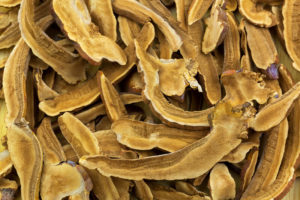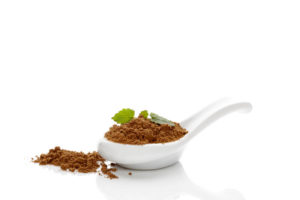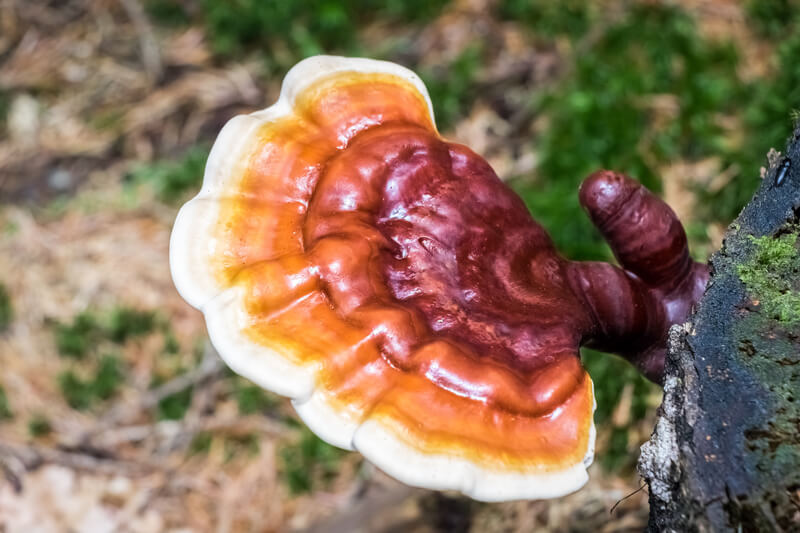Reishi mushrooms are not your average fungi.
The bioactive components found in reishi mushrooms (Ganoderma lucidum) have been shown and suspected, among other things, to have a soothing effect on the nervous system. One such compound is triterpene, which can ease anxiety.
While not familiar to many Americans, reishis have long been used for general health and longevity in Japan and China.
They grow in many places from forests of Asia to Morocco.

Stress: one of the biggest culprits behind poor sleep quality.
Reishis are studied as an antimicrobial, anticancer agent, and immune booster.
Many report they act to improve sleep, too.
Another stress-regulating compound found in reishi is ganoderic acid. This adaptogen works its magic by modulating cortisol levels. Cortisol is also known as the stress hormone.
By fortifying the adrenals and keeping cortisol in check, reishi mushrooms allow you to slip into deep slumber more easily.
Anti-inflammatory properties
Rich in triterpenes, reishi mushrooms also have anti-inflammatory properties.
By reducing inflammation, these fungi are conducive to better sleep quality.
Sitosterol, also found in reishi, inhibits cholesterol from entering the bloodstream. This also has a positive effect on cholesterol levels and inflammation.
Brain health support
Reishi contains antioxidants that help protect brains from oxidative stress and damage caused by free radicals.
They’ve also been found to enhance cognitive function and memory retention.
Reishi for insomnia
There are various ways you can incorporate this useful herb into your bedtime routine.
-
Tea: Brew yourself a warm cup of reishi tea before bed. Steep dried reishi slices or use powdered reishi extract in hot water.
-
Supplements: Reishi supplements in capsule or tincture form provide a concentrated dose of the compounds.
-
Reishi-infused Foods: Get creative with your cooking by adding dried or powdered reishi to soups, stews, smoothies, or even desserts like chocolate truffles.
For best results, I find sleep supplements are most effective when used in conjunction with good sleep hygine—with the emphasis (the most important component of the two) being on sleep hygiene.
Reduces sleep onset time, prolongs sleep duration

You may experience a shorter sleep onset time using reishi, allowing you to drift off more quickly.
Regular use of reishi can help regulate your sleep-wake cycle, signaling to your body when it’s time to wind down and prepare for rest.
It can also prolong your sleep, as animal experiments demonstrate.
Reishi doesn’t work well as a one-off sleep medication. That’s because it works by changing the microbiome in your gut. It has to be part of a routine.
Reishi dosage and timing for sleep
Recommended dosages
There is no one-size-fits-all dosage. The recommended dosage can vary depending on factors such as age, weight, overall health, and individual sensitivity. It’s always best to start with a lower dose and increase if needed.
For most individuals, a daily dose of 1-2 grams of dried reishi mushroom powder is considered safe and effective for promoting better sleep. However, some people may find they need a higher dosage to experience the desired effects. It’s advisable to consult with a healthcare professional or a qualified herbalist who can provide personalized guidance based on your specific needs.
Supplements are generally more concentrated than capsules, so it’s advisable to follow dosage information on the package.
The optimal time to consume reishis for maximum sleep benefit
The timing of when you consume reishi mushrooms can impact their effectiveness as a sleep aid. Ideally, take them about an hour before bedtime. This allows enough time for the active compounds in the mushrooms to be absorbed by your body and start taking effect.
Potential interactions with other medications or supplements
Reishi mushrooms are safe for most when taken in appropriate dosages. It’s important to be aware of potential interactions with other medications or supplements. Reishis have blood-thinning properties which could interact with anticoagulants, such as warfarin or aspirin.
Benefits and drawbacks of using reishis vs. prescription sleep aids
Benefits of using reishis
-
Holistic approach: Reishis work by supporting the body’s natural processes (the biome of your gut) rather than artificially inducing sleep. They help to balance the body’s energy levels and promote overall well-being.
-
Fewer side effects: Prescription sleep aids can cause drowsiness, dizziness, and even dependency. In contrast, reishis are generally well-tolerated and have minimal side effects.
-
Natural ingredients: Reishis contain compounds with a calming and relaxing effect.
Drawbacks of using reishis
-
Individual variation: The effectiveness may vary from person to person. Some may experience significant improvement; others may not notice anything.
-
Time frame: Unlike prescription sleep aids, reishis may take time to show their full effects. Consistent use over a period of weeks or months may be necessary to experience the desired improvements in sleep quality.
-
Lack of regulation: Unlike prescription medications, reishis are not regulated by government bodies such as the FDA. The quality and potency of reishi products can vary significantly between brands.
Potential side effects of reishi for sleep
Some may experience digestive issues such as diarrhea, nausea, or an upset stomach after consuming reishis. This is more likely if you consume them in large quantities or on an empty stomach. To avoid this, start with a small dose and gradually increase it over time.
Others may have an allergic reaction to reishi mushrooms. Symptoms can range from mild itching and skin rashes to more severe reactions like difficulty breathing or swelling of the face, lips, tongue, or throat. If this happens, discontinue use at once and seek medical attention.
Reishi mushrooms are blood-thinning. That’s not necessarily bad, but if you have a bleeding disorder or are taking anticoagulants, consult with your healthcare provider before use. Further, if you’re scheduled for surgery, let staff know you take reishi.
Pregnancy and Breastfeeding: Limited research is available on the safety of using reishi mushrooms during pregnancy and breastfeeding. Avoid taking unless recommended by your healthcare professional.
Reishi mushrooms boost the immune system. This also can be good, but that also means they may not be suitable for individuals with autoimmune disorders such as rheumatoid arthritis or lupus. The immune-enhancing effects could worsen symptoms or trigger flare-ups in these conditions.
Contraindications or interactions with certain medications
-
Blood Pressure Medications: Reishi mushrooms can lower blood pressure in some individuals. The key word there is “some.” If you are already taking medications for high blood pressure, combining them with reishis could lead to excessively low blood pressure levels. This is another reason to check with your healthcare provider before you start taking them.
-
Immunosuppressant Drugs: As mentioned earlier, reishi mushrooms have immunomodulatory effects that can enhance the immune system’s function. If you are taking immunosuppressants following an organ transplant or for other reasons, using reishis may interfere with these medications.
-
Diabetes Medications: Reishi mushrooms may lower blood sugar levels. Combining the two could result in low blood sugar. Use with caution and monitor your blood sugar closely.
Print Citation
Sánchez-Hernández, E., Teixeira, A., Pereira, et. al. (2023). Chemical Constituents and Antimicrobial Activity of a Ganoderma lucidum (Curtis.) P. Karst. Aqueous Ammonia Extract. Plants, 12(12), NA.
Also on the blog:
James Cobb, RN, MSN, is an emergency department nurse and the founder of the Dream Recovery System. His goal is to provide his readers with simple, actionable ways to improve their health and maximize their quality of life.
We use some affiliate links. If you click on a link and make a purchase, we may receive a commission. This has no effect on our opinions.
